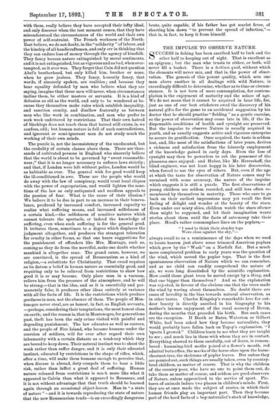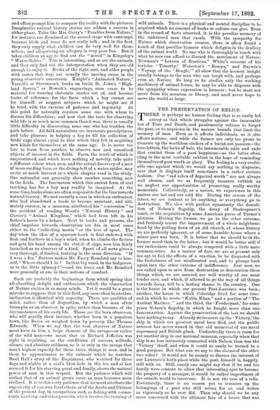THE IMPULSE TO OBSERVE NATURE.
SUCCESS in fishing has been ascribed half to luck and the other half to keeping out of sight. That is excellent as an epigram ; but the man who trusts to either, or both, will never fill a basket. There is a tertium quid, without which the elements will never mix, and that is, the power of obser- vation. The genesis of this potent quality, which seta one man above another in all dealings with wild Nature, is exceedingly difficult to determine, whether as to time or circum- stances. It is not born of mere contemplation, for contem- plation is the enjoyment of maturity and the solace of age. We do not mean that it cannot be acquired in later life, for, just as one of our best cricketers owed the discovery of his natural gifts for the game to an accidental suggestion by his doctor that he should practise" fielding" as a gentle exercise, so the power of observation may come late in life, if the in- dispensable conditions of health and eyesight are preserved. But the impulse to observe Nature is usually acquired in youth, and as usually suggests active and vigorous enterprise to secure its gratification. Once acquired, the taste is seldom lost, and, like most of the satisfactions of later years, derives a richness and satisfaction from the leisurely employment of the knowledge gained in early days. Even the loss of eyesight may then be powerless to rob the possessor of the pleasures once enjoyed : and Huber, like Mr. Herreshoff, the blind engineer, was not least happy in his later discoveries, when forced to use the eyes of others. But, even if the age at which the taste for observation of Nature comes may be surmised with some accuracy, the nature of the impulse which suggests it is still a puzzle. The first observations of young children are seldom recorded, and still less often re- membered by themselves in maturity. Those who care to go back on their earliest impressions may yet recall the first feeling of delight and wonder at the beauty of the stars. Even under our misty skies, children watch the stars of tener than might be supposed, and let their imagination weave stories about them until the facts of astronomy take their place. Hood's rather commonplace lines on the poplars,-- "I used to think their slender tops Were close against the sky,"— always recall to us a reminiscence of the days when we used to locate heaven just above some trimmed American poplars which grew by the "Wash" on a Norfolk flat. But a much more complicated problem to early years was the question of the wind, which moved the poplar tops. That is the first spontaneous observation of Nature which we can remember, and as no child can readily comprehend the nature of air, we were long dissatisfied by the scientific explanation. How could those giant trees be moved except by a thing, and that one bigger than themselves ? And so the explanation was rejected, in favour of the obvious one that the trees made the wind by waving about themselves. No doubt there are cases of heredity in the bias towards natural observation, as in other tastes. Charles Kingsley's remarkable love for out- door beauty is directly ascribed in his biography to his mother's intense enjoyment of the rural scenery of Devon, during the months that preceded his birth. But such cases are the exception. If Booth or Bates, Waterton or Gilbert White, had been asked how they became naturalists, they would probably have fallen back on Topsy's explanation, "I 'spects I growed." Children learn to see what they are taught to see ; and much lies in those with whom they are in contact. Everything showed to them carefully, out of doors, is remem- bered: humming-bird moths poised at a flower's mouth, red admiral butterflies, the marks of the horse-shoe upon the horse- chestnut-tree, the skeletons of poplar leaves. But unless they are pointed out, such things are usually taken, even by country. bred children, as matter of course. That is why the children of the country poor, who have no one to point them out, do take them as matter of course, and seldom are good observers of Nature, unless apprenticed to the service of sport. Pic- tures of animals induce two phases in children's minds. First, they are at once made the subject of stories, in which their human friends play an important part. Then they become part of the hard facts of a boy-naturalist's stock of knowledge,
and often prompt him to compare the reality with the pictures. Imaginative natural history stories are seldom a success in 'either phase. Tales like Mrs. Gatty's "Parables from Nature," for instance, are dismissed at the second stage with contempt, because birds and trees do not really talk ; and in the first, they only supply what children can do very well for them- selves; and allegorising an allegory is very poor fun. But it takes children an age to find out the "moral" in Kingsley's "Water-Babies." Tom is interesting, and so are the animals, and they only find out the interpretation when they are old enough to enjoy it. Books of the right sort, and older people with tastes that way, are usually the moving cause in the young observer's conversion. Knight's " Animated Nature," Yarrell's or Stevenson's books on birds, St. John's " High- land Sports," or Bewick's engravings, soon cease to be material for weaving elaborate stories out of, and become books of reference for the facts which a boy cannot see for himself, or suggest subjects which he might see if he tried, with the exercise of patience and ingenuity. At this point he naturally requires some one with whom to discuss his difficulties ; and now that the taste for observing wild life is so much more common than it was, there is usually little difficulty in discovering some one who has trodden the path before. All field-naturalists are inveterate proselytisers, and take pleasure in helping a boy to fill his collection of birds' eggs almost equal to that which they felt in acquiring new kinds for themselves at the same age. It is never too late to learn from another, to observe new and unnoticed objects of interest in the fields. Facts, the truth of which is unquestioned, and which have nothing of novelty, take quite a different colour when seen, and the actual discovery of a nest of moss-carding bees, or the diving-bell of a water-spider, may excite as much interest as a whole chapter read in the study. One naturalist can generally show another something new in the fields. The fascination which this easiest form of oral teaching has for a boy may readily be imagined. At the same time, books alone are often responsible for the bias towards natural history. We met recently a case in which an enthusiast, who had abandoned a trade to become assistant, and ulti- mately curator, in a museum, attributed his " conversion " to the accident of reading Wood's "Natural History" and Cnvier's "Animal Kingdom," which had been left in his father's house by a lodger. Next to books and persons, the chief impulses towards observation are due in most cases either to the "collecting mania" or the love of sport. The day when the idea of a sparrow-hawk is first endowed with flesh and feathers in a boy's mind, when he climbs the fir-tree and gets his hand among the clutch of eggs, sees him fairly launched as an observer of a kind. Sport of all sorts gives a very thorough, if limited, training in the same direction. "If I were a fox," Surtees makes Mr. Facey Romford say to him- self, "Where should I lie ? In that big wood, in the hedgerow, or in the little spinney ?"—and the foxes and Mr. Romford were generally at one in their notions of comfort.
Such are probably the beginnings from which spring that all-absorbing delight and enthusiasm which the observation of Nature excites in so many minds. Yet it would be a great mistake to suppose that in this field, any more than in another, inclination is identical with capacity. There are qualities of mind, rather than of disposition, by which a man often triumphs as an observer, in spite, rather than because, of the circumstances of his early life. Those are the born observers, who will gratify their instinct, whether born in a populous town, like Bates, or weighed down by poverty. like Thomas Edwards. When we say that the best observer of Nature must have in him a large element of the savage—or rather of the wild man—we mean that as Richard Jefferies was right in requiring, as the conditions of success, solitude, silence, and absolute stillness, so it is only in the savage that man's highest capacity for these three things is seen, and in them he approximates to the animals which he watches. Basil Hall's story of the Esquimaux, who watched for three days and nights at a seal's blow-hole in the ice, and at last secured it for his starving guest and family, shows the natural power of man in this respect. But the patience which will outlast that of an animal grows rarer as man becomes more civilised. It is to this early patience that we must attribute the superiority of our own forefathers, or of the Arabs and Chinese of the present day, in occupations such as fishing with cormo- rants, hawking, and other pursuits, which involve the training of
wild animals. There is a physical and mental discipline to be acquired which no amount of books or culture can give. Even in the record of facts observed, it is the peculiar memory of the unlettered man that excels. With the sympathy for Nature which observation creates, there is often found a touch of that peculiar humour which delights in the drollery of the animal world. No one who is thoroughly in touch with what be sees can afford to discard the merriment of Nature. Newman's "Letters of Rusticus," White's account of his tortoise Timothy,' Waterton's "Essays," and Darwin's "Voyage of the Beagle," all show that the keenest insight usually belongs to the man who can laugh with, and perhaps even at, Nature. So long as he studies only the working machinery of animal forms, he may be able to dispense with the sympathy whose expression is humour ; but he must not move from his museum or library, and need never hope to. move the world at large.



































 Previous page
Previous page